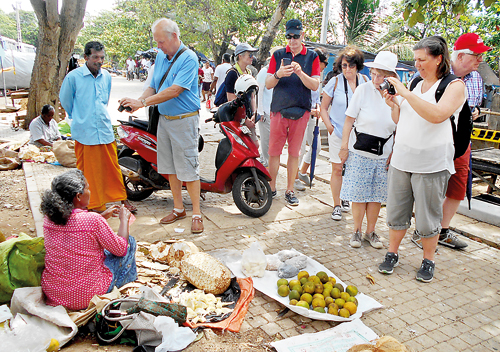To be considerate as we all try to recover
View(s):
File picture of tourists with a wayside vendor.
“Priyantha is a manager attached to a leading hotel, located in the Southern coast of Sri Lanka. Priyantha’s rise to his current designation is a true rags to riches story. Having started in the same hotel in a very junior role, it was Priyantha’s hard work and personal goal of rising in the hotel sector that has seen him to this role. He prided himself in seeing how tourism has grown in the country, and finds great joy that the work of his team and himself contributed to the growing economy of the country. He found immense meaning in the fact that the growth of tourism and the success of the hotel enabled his staff, young people from poor families just like his own, to work for a better future.
It was this flow of positivity and meaning that was dramatically disrupted following the Easter Sunday attacks of April this year. In a blinding and confusing week, Priyantha’s work changed drastically. The hotel, which was at full occupancy, was near empty within a day. Reservations for the weeks and months to come were cancelled at an unprecedented rate. The hotel was quiet, desolate. As it became clearer that the occupancy situation would not be resolved soon, the management commenced making redundancies. Having no choice, the hard working employees who had made no errors were kindly requested to go back home. The remaining staff had to adjust their lifestyles as their income reduced significantly, due to the lack of add-on from service charge. Priyantha had to watch helplessly and in dismay, as the staff and families he was so proud of empowering started to struggle to make ends meet.”
This is the heartbreaking truth for the hospitality industry in Sri Lanka. Hotels in which booking a room was a task in itself, are now empty. The industry collapsed from a thriving one to a black hole. Managers such as Priyantha struggled to brainstorm solutions to keep the hotels afloat, whilst also maintaining the engagement and morale of their staff – who were severely disheartened. Individuals from the hospitality sector have narrated the struggles juggling the mixed box of emotions; the grief for all those who lost their lives, the remorse for colleagues who lost their jobs, the fear for the uncertainty that loomed over their careers and lives, and the apathy towards work.
“Priyantha recalls the numbers of staff members who approached him to share their grievances, desperately hoping that ‘Sir’ will be able to help. They told him stories of loans that had been taken that needed to be repaid – which they would not be able to do without the addition of service charge to their basic wage. They shared their fear and anxieties about meeting the needs of their wives and children. They shared their shame and embarrassment when they faced ridicule at the hands of in-laws and extended families, for being in an industry that was as fickle as time, for failing to offer stability and security when it was most needed. His inability to offer any useful advice to his staff, or to support them in any other way haunted Priyantha. He felt hopeless and helpless. He felt as if the burdens and struggles of his staff were carried on his shoulders, in addition to his own fears and difficulties. Overwhelmed by the emotions he was facing, he started to lose sleep, and had to turn to large doses of sleeping medication to get some rest at night.”
Despite the challenges, the hospitality industry buckled up. Slashing their rates and charges by 50 per cent, and sometimes more, the industry turned to the local tourists of Sri Lanka, inviting them to visit the hotels and to enjoy. Managers and leaders worked long hours ironing out budgets and strategy to make sure that the hotel was able to function in a sustainable manner where possible, while opening their doors at these concessional rates.
These tantalizing offers by hotels that most Sri Lankans would usually not be able to afford provided a moral dilemma. In the wake of the losses the country faced, was it right to be traveling and having fun? Was it insensitive to enjoy little luxuries like hotel stays and buffet meals? Some locals made the complex decision of visiting these hotels – not to indulge in luxury, but to support the local hotels. With this, commenced some support from Sri Lankan citizens to local businesses, to support the services industry in the aftermath to prevent its collapse.
“By the second week of May, things were changing. Following the introduction of the new offers for local travelers, the occupancy of the hotels started to rise, slowly and sometimes fully booked on weekends. Local tourists were coming in large groups for day-outings, and for brief one-night stays. The staff, who had been forlorn about the drop in work and occupancy, were enthusiastic and excited to be able to serve once more.”
“As the local tourists begin to pour in though, the staff’s enthusiasm started to deflate almost immediately. Their local customers were demanding and difficult. They complained at the most minor infractions, making large spectacles publicly. They complained loudly about the smaller spreads at buffets, and the lack of staff in the hotels, turning immediately to social media to complain about their grievances. One staff member, a waiter, came to Priyantha in near tears when a local tourist had yelled at her for not refilling her glass of water, and exclaiming that it was this poor service across the hotel.”
 “Another receptionist called Priyantha frantically on his day off, saying a guest had made claims to “know” the ‘chairman’ or a prominent head in the hotel, and demanding first-class treatment – the fifth guest in a week to have made such a claim. (Upon further investigation it was found that the guest had merely met the chairman on one occasion!) At morning catch up meetings, the staff confessed to being emotionally exhausted in a different way, and feeling disheartened that their own countrymen were making things more difficult at such a tricky time.”
“Another receptionist called Priyantha frantically on his day off, saying a guest had made claims to “know” the ‘chairman’ or a prominent head in the hotel, and demanding first-class treatment – the fifth guest in a week to have made such a claim. (Upon further investigation it was found that the guest had merely met the chairman on one occasion!) At morning catch up meetings, the staff confessed to being emotionally exhausted in a different way, and feeling disheartened that their own countrymen were making things more difficult at such a tricky time.”
In the wave of low occupancy and difficult and demanding local tourists, managers such as Priyantha are struggling not only to maintain engagement, but to also ensure their top performers don’t resign from their roles. The hospitality industry is still working tirelessly to maintain a balance and to stay afloat in these trying times, to attract tourists from across the world once more.
So far, whilst some of our local tourists did flock to the hotels to support the economy, some of us may have neglected to support our enterprises with one key currency – that of compassion. The high expectations and behaviours of some of the local customers have truly hurt those who are still striving to stand on their feet once more. This is a gentle reminder to our fellow countrymen to extend a note of kindness to those in the hospitality industry today. To be considerate, patient, and understanding as the hospitality industry strives to pick up the pieces to build Sri Lanka’s economy again, one step at a time.
(The writer is a Business Psychologist, the Founder of Forté Consultancy and the author of ‘From Crisis to Character and a co-author of ‘Rockstars-Creating Stellar Performers in Organisations’. She can be contacted on rozaine@forte.lk)


